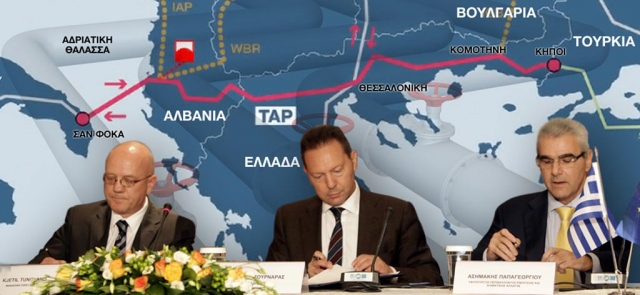Photo: newmoney.gr
The Shah Deniz consortium has preferred the Trans-Adriatic Pipeline (TAP) to transport the Azeri gas from the Caspian to the European Union as announced by the head of British Petroleum for Azerbaijan, Georgia and Turkey.
The construction of the pipeline will start in 2014 from the Greek-Turkish border, where it will connect to the Turkish pipeline TANAP. 478 km of the length of the pipeline will pass through northern Greece and then subsequently it will cross Albania. In the section to Italy, the pipeline will be built on the seabed.
The contract for Greece's involvement in the energy project was signed two days ago, several hours after it became clear that the Nabucco West project had been rejected.

Photo: ethnos.gr
The total investment in the country will amount to 1.5 billion euro and it is expected that the first supplies of Azeri gas to Europe will be in 2019. At first, the supplies will amount to 10 billion cubic metres annually and will possibly double over the years.
Antonis Samaras defined the choice of the TAP pipeline as the most important economic event for the country in the last ten years. In his statements from Brussels, he said that this decision would turn Greece into an energy pole that would attract new investments and companies.
According to the Greek Prime Minister, at first, the TAP project did not seem to be the preferable option. "We took a strategic decision, launched it quietly, worked in accordance with our plan and we have succeeded. Today's decision is another incentive that makes us emerge from the crisis as soon as possible. It also shows that Greece for which we are working today will be better, stronger and more competitive than that before the crisis," he said.
Antonis Samaras stressed that the direct investment would exceed 1.5 billion euro only in Greece and presented the benefits of the project for the country. "This pipeline was not the only option for the transportation of Azeri gas to Europe. To be precise, until recently, there was only one candidate of another pipeline that would have not passed at all through Greece since it would have directly entered Bulgaria after Turkey. From there, it would have passed through Romania to reach Central Europe. We worked in favour of the TAP option and we have won the project in a very short period of time."
According to the Greek Prime Minister, the completion of such an important project is placing Greece on the map of pipelines and energy supplies to Europe. "This is a very important "vote of confidence" in Greece and its future in the European structures. Following the announcement of the decision on the project, all catastrophic scenarios for the country cease forever just because they make no sense. For, tell me, who would have invested so much money in an economically, socially and politically unstable country, especially when it comes to some of the biggest international companies?"
Antonis Samaras said that the pipeline would create 2,000 direct jobs and another 10,000 in different companies that will participate in the project. At the same time, it is expected that the project will bring significant revenues from taxes as well as profits for the local communities and owners of land through which the pipeline will pass.
"Greece will directly benefit from it since it will not be dependent on a single gas supplier and it is expected that we will have lower prices for an environmentally friendly energy source. At the same time, our geopolitical position in the Balkans and Europe as a whole is improving as well. The countries in the region will also be able to procure natural gas from the TAP pipeline at a later stage."
It is expected that the construction of the pipeline will take about 3-4 years. The Greek natural gas company DEPA is already negotiating the supply of one billion cubic metres of gas for the needs of the Greek market with the consortium developing the Shah Deniz field in Azerbaijan. The contract also provides for the construction of interconnectors to supply Bulgaria and Romania with Azeri gas as stated by Yiannis Maniatis, Minister of Environment, Energy and Climate Change and his deputy Makis Papageorgiou after the official announcement of the decision on TAP.
They also said that the preconditions provide for a 5% stake of the Greek state in the consortium, which will start functioning after the completion and start-up of the pipeline.
According to the Ministry of Finance, the revenue that the operation of TAP will bring to Greece will amount to 320 million euro within 15 years. The contract does not provide for the deduction of fees for its passing through the country. In addition to Bulgaria and Romania, it is expected that there will be supplies to the countries of the Western Balkans as well.
As regards gas prices, Yiannis Maniatis states that negotiations with the Russian company Gazprom are already underway to reduce them since the increase in the number of sources improves the competition to the benefit of consumers.